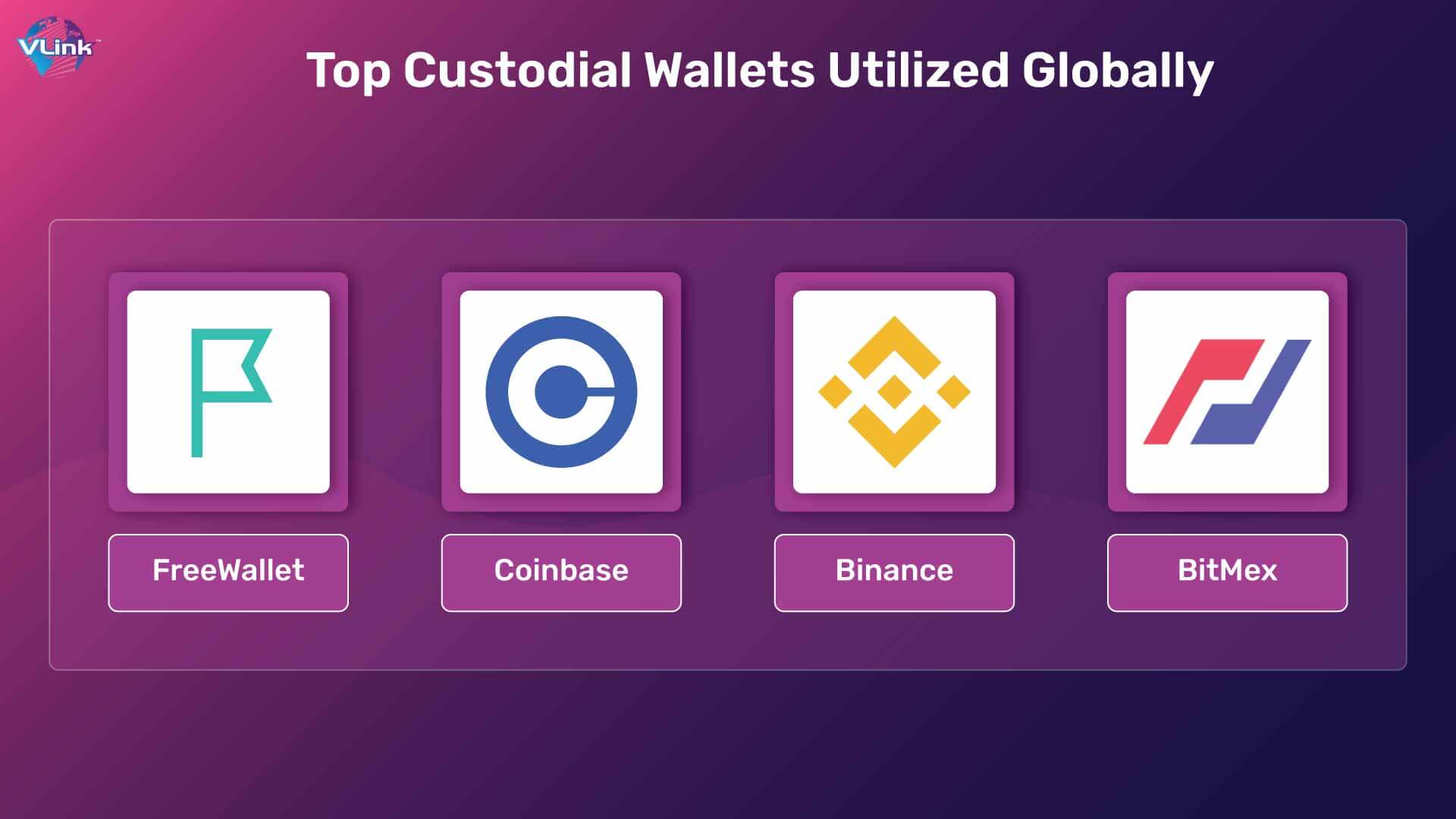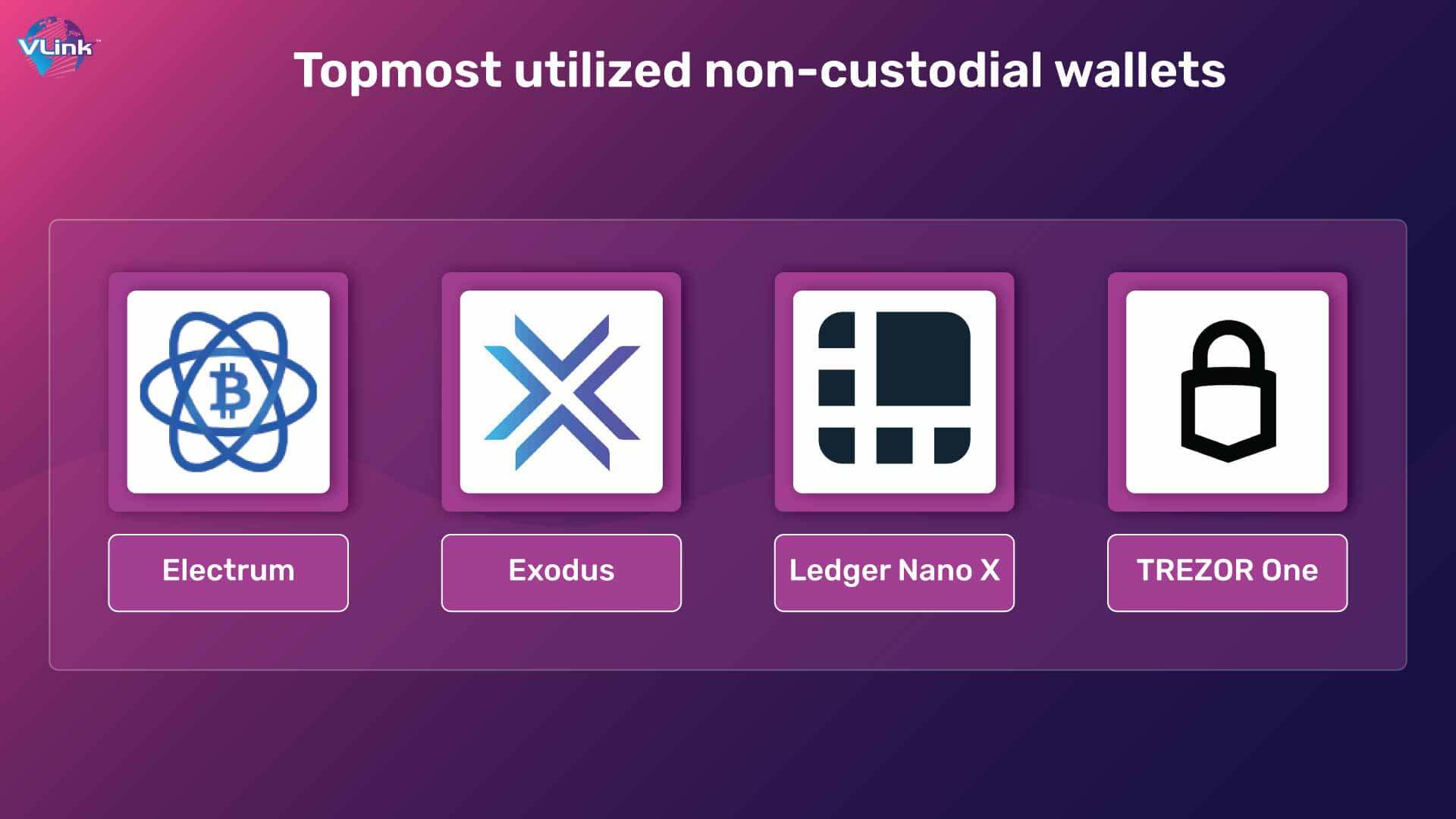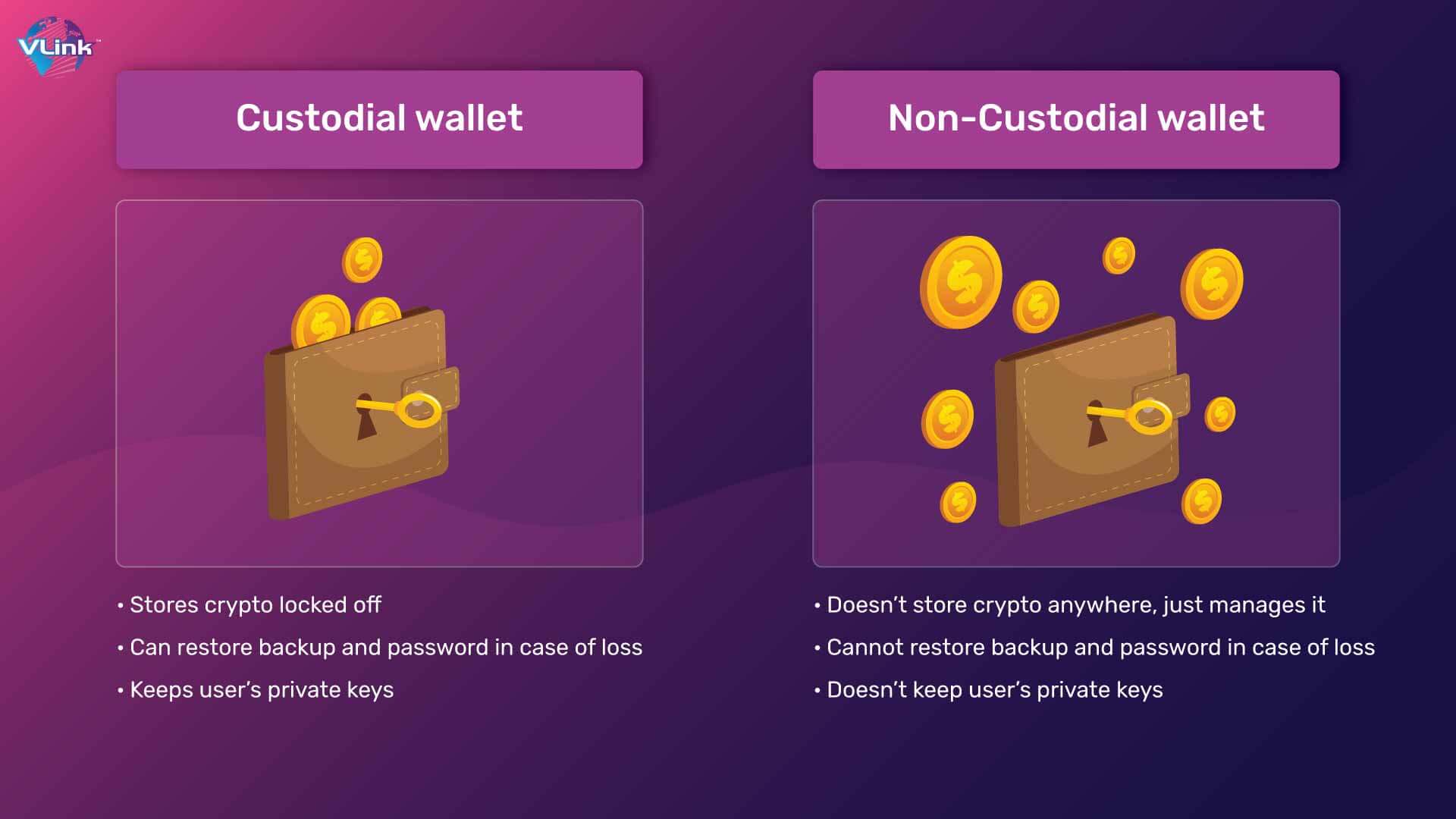The way the world views money is changing, and one of the most cost-effective ways to expand its use is through popular cryptocurrencies. As cryptocurrencies have become popular in recent years, it is important to understand the different types of wallets you can use to store your cryptocurrencies.
Custodial wallets and non-custodial wallets are two main types, and they are used with different purposes as well as requirements.
This blog will provide all the information regarding custodial wallets vs non-custodial wallets. It includes the comparison, advantages, drawbacks, and top platforms that are available in the market. Let’s get started.
What are crypto wallets?
A cryptocurrency wallet is a program that tracks private and public keys and connects them to various blockchain networks, allowing users to send, receive and manage cryptocurrencies.
There are many ways to get cryptocurrencies, such as buying it on an exchange, getting money in cryptocurrencies, or getting paid. But no matter how you get it, it's important to have a secure wallet.

Your wallet creates a unique address that identifies you on the blockchain. Cryptocurrency wallets use two types of keys: public and private. Although the public key can be shared, the private key acts as a password to protect your assets. Keeping your private keys safe is very important because they provide access to all your crypto assets and tokens.
What are custodial wallets?
A clear understanding of storage wallets requires knowing the features of cryptocurrency wallets. Instead of storing real money, cryptocurrency wallets contain public keys to configure transactions and private keys to authorize transactions.
As the name suggests, a custodial wallet is where a third party stores a user's private keys. These third parties have full rights to crypto assets and perform functions such as managing wallet keys, authorizing transactions, and protecting users' digital assets.
In general, custodial wallets can be obtained through cryptocurrency exchanges or a designated provider via a mobile or web application or a well built up NFT marketplace. After logging into their wallet account, individuals utilize the service provider's interface to oversee their funds and conduct transactions.
Therefore, users must rely on the trust of service providers to protect their tokens and use effective security measures to prevent unauthorized access. These measures may include things like two-factor authentication (2FA), email verification, and biometric methods like facial recognition or fingerprints.

Advantages of Choosing a Custodial Wallet
Zero Transaction Fees
One of the main advantages of custodial wallets is that there are no transaction fees. Unlike other wallets, customers can transact in the system for free. For example, the wallet managed by FreeWallet helped users save around $500,000 in network fees in 2019.
Limited Impact of Lost Private Keys
With custodial wallet deployed for business use, your keys are managed by a third party. So if you lose your private keys or forget your mnemonic phrase, accessing your wallet and getting a refund is simple.
Enhanced Backup Options
Custodian wallets also have the added benefit of being able to provide backup services from a central authority. This allows you to easily undo changes or revert to previous settings.
Disadvantages of Custodial Wallets
Handling of finances
One of the downsides of using custodial cryptocurrency wallets is that you have limited access to your wallet. The custodian or third party has all rights to your funds and can take actions such as freezing them.
Need for KYC
Custodial wallets also require users to go through a Know Your Customer (KYC) process to verify their identity. If you do not complete this process, you will not be able to access your account or associated services. This requirement violates the fundamental principle of anonymity in cryptocurrencies.
Data security
There is a danger of data being compromised in a data breach. When you buy cryptocurrency for the first time, it is highly probable that it will be through an online crypto wallet with custodial services.
Offline support unavailability
With Custodial cryptocurrency exchanges, large amounts of customers' funds are held in both cold and hot wallets. These wallets may not be easily accessible to hackers due to multiple confirmations, but they can still be at risk of security breaches.
What are non-custodial wallets?
A non-custodial or self-custody wallet in the simple language is one where the crypto owner assumes complete responsibility for managing their funds. In this type of wallet, the user has total control over their cryptocurrency portfolio, maintains their own private key, and conducts transactions independently.
There are various types of non-custodial wallets available. Browser-based wallets function as extensions on web browsers, allowing users to input their private key and initiate transactions. Mobile wallets can be downloaded as apps on mobile devices.
On the other hand, hardware wallets are physical devices that provide offline access for increased security measures, making them a preferred option for many individuals.
Non-custodial wallets offer users a seed phrase, which is a set of 12 randomly generated words that serves as a cloud-based backup and recovery mechanism. These words are used to generate the public and private keys necessary for managing transactions. However, it's important for users to safeguard this phrase as anyone who has access to it can control the funds in their wallet.

If the seed phrase is lost, the user will no longer be able to access their funds. Additionally, users are responsible for initiating and completing transactions by using their private keys. The transaction can either be immediately recorded on-chain or signed offline and confirmed later on, depending on the specific non-custodial wallet being utilized.
Benefits of Non-custodial wallets
Complete fund control
The main factor driving the increasing popularity of Non-Custodial services is their ability to give users full control over their funds. This eliminates the need to rely on third parties to manage or handle their finances.
Security in handling finances
With complete ownership and responsibility of one's online Crypto wallet and its contents, the chances of data breaches are significantly reduced. As a result, most crypto holders (66.5%) are now turning towards non-custodial and mobile storage solutions for added safety.
Quick withdrawals
These wallets work without the requirement for third-party confirmation for every transaction, in contrast to the finest Custodial wallets. This simplifies everything and makes it simpler to take advantage of fast withdrawals.
Now that this is clear, let's investigate the drawbacks of non-custodial cryptocurrency wallets in order to arrive at an unbiased choice.
Disadvantages of Non-custodial Wallets
Delay in trade
Since the money will first be transmitted to an exchange in noncustodial, trading it immediately will be difficult.
Greater accountability
There is a great deal of responsibility when it comes to your personal security. The slightest error might result in theft, erasure, or unforeseen events.
User-friendly design
The presentation of user interfaces is a little trickier to comprehend. A sleek and less complex UI/UX design solution will benefit the wallet’s interface.
Money lost when keys are lost
There won't be anyone to help you restore your wallet or data in the unlikely event that you misplace your key and seed phrase. The user may lose access to their wallet if they misplace their private key or mnemonic seed, in which case there is no way to restore or backup their data.
After talking about the variations between custodial and non-custodial wallets, let's take a closer look at them side by side:
Comparison: Custodial wallets vs Non-custodial wallets

- Security: Since the user has exclusive control over their private keys, non-custodial wallets are typically more secure than custodial wallets.
- Usability: Since the user does not have to worry about the technical requirements of keeping their wallet, custodial wallets are typically easier to use than non-custodial wallets.
- Control: Custodial wallets transfer control of the cryptocurrency to a third party; non-custodial wallets allow the user total control.
- Reliability: With custodial wallets, the user has to have faith in a third party to handle their bitcoin; with non-custodial wallets, there is no need for this kind of faith.
- Cost: While non-custodial wallets are frequently free to use, custodial wallets could have extra costs attached to them.
- Backup & recovery: Self-custodial wallets, or non-custodial cryptocurrency wallets, fall short of custodial wallets in terms of backup and recovery capabilities. The private key is retained by the custodial wallets. Thus, even if you misplace your data access, you may get it back by asking a third party. However, when it comes to non-custodial wallets, where you are the main
Which one should you choose: Custodial wallets vs Non-custodial wallets?
The choice between a custodial and non-custodial cryptocurrency wallet type mostly comes down to personal preference and functionality. Newcomers and individuals who appreciate the set-and-forget aspect of handling their cryptocurrency through a trading platform or other regulated wallet provider typically choose custodial wallets.
Know everything about digital wallet app development for you business.
Users that wish to have more control over who may access their money can utilize non-custodial wallets. Both kinds of wallets have advantages and disadvantages, so before making a choice, consider how comfortable you are with the aspects that are most important to you.
The benefits that each wallet provides, such as cryptocurrency debit or credit cards, staking options, cashback incentives, and the range of coins it supports, should also be taken into account.








 Shivisha Patel
Shivisha Patel

















